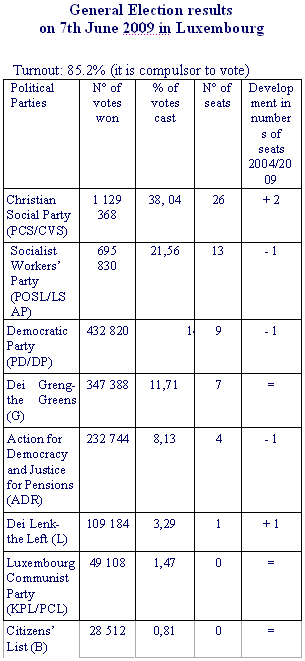News
Corinne Deloy,
Fondation Robert Schuman,
Helen Levy
-

Available versions :
EN

Corinne Deloy
Fondation Robert Schuman
Helen Levy
The Christian Social Party (PCS/CVS) of Prime Minister Jean-Claude Juncker won the general elections that took place in Luxembourg on 7th June last, on the same day as the European election. He won 38.04% of the vote and 26 seats (+ 2 in comparison with the previous election on 13th June 2004). He came out ahead of his outgoing coalition partner, the Socialist Workers' Party (POSL/LSAP), that won 21.56% of the vote and 13 seats (- 1). The POSL lost one seat to Dei Lenk-the Left (G) in the South constituency, the industrial basin where it was the dominant political force for a long time. The two government parties improved their positions on the occasion of these elections. The Prime Minister who has been in office since 1995 can also be pleased at being the candidate to have won the greatest number of individual votes. The Democratic Party (PD/DP) won 14.98% of the votes and 9 seats (-1). The fact that it made its managing team younger was not enough to convince the voters that it had changed. Dei Geng-the Greens (G) remained stable and won 11.71% of the vote and 7 seats. Action for Democracy and Justice for Pensions (ADR) recorded a decrease: 8.13% of the vote and four seats (- 1), a figure which deprives it of a parliamentary group. Its leader Roby Mehlen, an MP for 20 years, was not re-elected. Dei Lenk-the Left (L) won 3.29% of the vote and one seat (André Hoffmann in the South constituency). Finally the Communist Party (KPL/PCL) won 1.47% and the Citizens List (B), 0.81%.
Jean-Claude Juncker has therefore been re-elected to the post of Prime Minister for five years and has to continue working with the POSL. The leader of the Christian Social Party who decided that he wanted to withdraw from national political life on the occasion of the next general elections in 2014 announced that he would give the Finance portfolio that he also took care of to the Treasury and Budget Minister of the outgoing government, Luc Frieden. But he is however due to remain the leader of the Eurogroup, a monthly, informal meeting of Finance Ministers of the 16 Euro area states.
Jean-Claude Juncker undeniably embodies stability, a value approved by the Luxembourgers who are worried about the economic crisis, their jobs (the unemployment level is due to rise to 5 .9% in 2009, a threshold that has never been reached before and which is due to rise above the 7% mark in 2010), and for the sustainability of their buying power. "Staying together, believing together, the CSV, the path of security" said the electoral posters of Luxembourg's main party. All of the parties focused their campaign on the upkeep of social acquis and the protection of the automatic indexation of wages.
 Source: Official Internet site of the elections in Luxembourg http://www.elections.public.lu/fr/index.html
Source: Official Internet site of the elections in Luxembourg http://www.elections.public.lu/fr/index.htmlOn the same theme
To go further
Elections in Europe
Helen Levy
—
24 February 2026
Elections in Europe
Helen Levy
—
10 February 2026
Elections in Europe
Corinne Deloy
—
20 January 2026
Elections in Europe
Corinne Deloy
—
13 January 2026

The Letter
Schuman
European news of the week
Unique in its genre, with its 200,000 subscribers and its editions in 6 languages (French, English, German, Spanish, Polish and Ukrainian), it has brought to you, for 15 years, a summary of European news, more needed now than ever
Versions :


